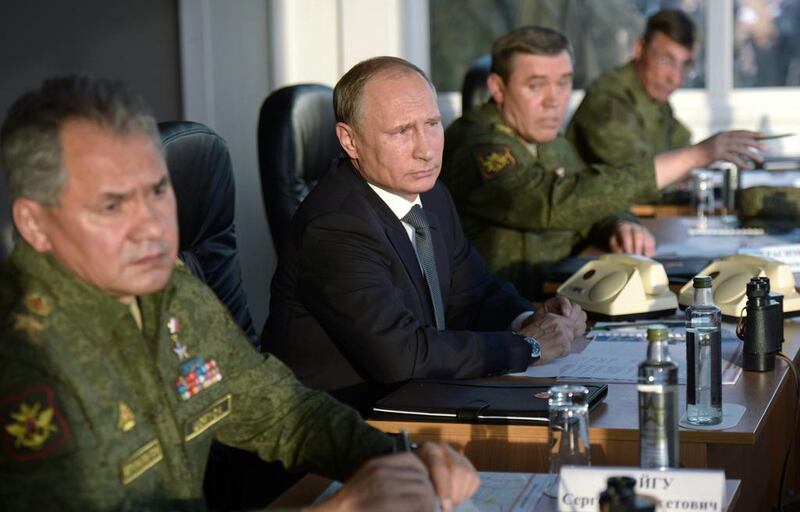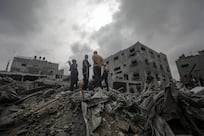In August 2012, Bashar Al Assad mocked the string of defections from the Syrian army as “a self-cleansing process” that would strengthen the country. Almost exactly three years later, Mr Al Assad gave a speech in which he made a striking confession that the army was seriously lacking troops.
“There is a lack of manpower,” he said in a speech in July. “Everything is available for the army, but there is a shortage in manpower. That does not mean we can talk about collapse. We will resist.”
A month later, news emerged of a Russian military build-up in Latakia. The deployment of Russian forces and equipment follows a noticeable deterioration in the army’s ability to stand its ground amid attacks by the rebels in different parts of the country. In Idlib, anti-government forces claimed back-to-back victories that left the regime’s heartlands in central and western Syria exposed for the first time since the conflict began. Similar gains were made by the rebels in the south and by ISIL in the central hinterlands such as Palmyra and Al Qariatayn in Homs.
Even within its support base, the regime suffered challenges. Many in Sweida objected to the deployment of their young men in conflict zones outside their province. Mounting agitation in Sweida forced the regime to allow Druze soldiers to fight in their areas, a remarkable concession. Draft-dodgers among Alawites added to the regime’s unease.
All the while Hizbollah and Iran supplied the regime with massive resources and elite forces to prevent its collapse. Dogmatic foreign fighters – from Lebanon, Iraq, Afghanistan and elsewhere – fought alongside the regime in key areas such as Damascus, Aleppo and near the Lebanese border.
Despite the tremendous and consistent support provided by Damascus’s allies, which contrasts sharply with the confused and divided positions of the rebels’ putative backers, the regime has retreated and shown signs of weakness that apparently necessitated a Russian intervention.
Given this reality, could Moscow save the Assad regime? What more could Russian manpower and equipment do to turn the tide in favour of Mr Al Assad? The answer is that the Russian intervention will be more successful than many like to think. But it will also be too limited to turn the tables.
Russian involvement will revamp and bolster the Syrian army. In addition to weapons and logistics, Russian forces will work closely with the army’s elite divisions, such as the 4th Armoured Division, to upgrade battalions and paramilitary forces and to fortify strategic territories from Damascus to the coastal region.
This will require technical expertise and close supervision to compensate for the defection of experienced low and mid-level officers. One of the reasons the army has suffered defeats since April is the apparent focus on providing resources to the paramilitary forces rather than to the army. Even so, these informal militias are not yet ready to take the place of the army. The Russians might professionalise such militias or at least better link them up to the elite army divisions.
Also, the Russian presence will enable the army to respond quickly and effectively to surprise attacks. Russians fighting alongside the regime will also boost the morale of Assad supporters, many of whom have fled the country or evaded conscription. Additionally, the Russian deployment will deter any moves by regional countries to intervene in Syria, including through the establishment of ad hoc safe zones.
The Russians will help the regime to secure and fortify its bases, but not to claw back lost territories. The problem for the regime is not firepower but ground forces capable of pushing back incessant rebel attacks, something that Hizbollah and Iranian fighters are better equipped to provide in the Syrian terrain. Hizbollah has made successive gains against the rebels in some areas but it also suffered defeats or impasse, including in areas where it has a strategic depth, notably near the Lebanese border. A Hizbollah-led three-month offensive in Zabadani, for example, failed to clear a few hundred rebel fighters, compelling Iran to negotiate a truce with the militants.
The idea that Russian fighters will enable the regime to reclaim territory is a fantasy. Russia also has little to offer against ISIL in eastern Syria, except perhaps to reinforce three airbases under attack by ISIL in Deir Ezzor, Aleppo and Homs. Moscow will bolster the regime’s capabilities to defend itself in key towns and cities, but nothing more.
Western officials are therefore greatly misguided to signal a softening towards Mr Al Assad in the wake of the Russian intervention. They should recognise they are fast losing any shred of credibility among the opposition.
The Russian intervention and the West’s overtures will lead to a far more complex situation. Foreign and local extremists will be galvanised to fight against a familiar foe, as they liken Russia in Syria to the Soviet Union in Afghanistan. When the regime’s supporters find that even Russia cannot dramatically turn the tide in favour of the regime, that will probably lead to a new wave of demoralised soldiers. And western countries, which claim to support the opposition’s cause, will have lost any leverage they may now have to play any effective role.
Hassan Hassan is associate fellow at Chatham House’s Middle East and South Africa Programme, a non-resident fellow at the Tahrir Institute for Middle East Policy and co-author of ISIS: Inside the Army of Terror
On Twitter: @hxhassan





